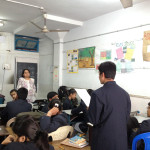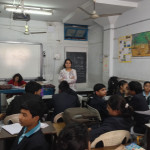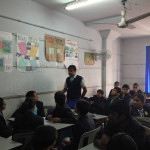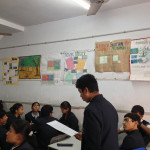January–February 2014
When Apeejay School, Park Street, signed up for the PeaceWorks literature curriculum, not once did I imagine that I would be the one addressing forty class niners. As the day finally arrived, I was set with multiple copies of Elias Canetti’s vignettes and a very nervous mind with random words tumbling around. The session began with an icebreaker where my random words—‘fashionista’, ‘cool dude’, ‘angry soul’, and ‘teacher’s pet’ among many others—became useful for the students to quickly match their classmates to the said identities. With much laughter and teasing, the class opened up to the idea of discussing what we just did.
The first two sessions took off from the game, focussing on the topic of identity. The class read pieces of Elias Canetti’s vignettes and Jerry Pinto’s ‘A Question of Identity’ and responded well to different parts of the process. One phenomenal response to the icebreaker was taken forward into discussing aspects of ‘curiosity’ and ‘multiple identities’. One of the students became a point of reference, having been attributed to both ‘fashionista’ and ‘gossip girl’ while playing the icebreaker. Her multiple identities within her own circle of friends led to further discussions describing how every single person there has multiple roles to play and how the role-switching happens almost unconsciously. After reading Jerry Pinto, the class unanimously responded that irrespective of the number of roles an individual portrays, his/ her national identity must take precedence over religious belief systems. That way, religious conflicts can be avoided within the country. Unfortunately, before we could take this discussion further in light of current reality of the situation, the session came to an end.
The following two sessions were based on gender. After addressing some spill over discussions from the previous session, the class proceeded to read Aishwarya Subramanian’s ‘Lotus’. The students’ response to this story was tangible. Post the stunned silence caused by realizing the brutality of female infanticide, the class jumped into a discussion on gender discrimination that included analysing situations where simple gestures in the name of tradition were in fact a direct following of a patriarchal society which has been internalized by man and woman alike. However, this discussion pointed at a newer generation who clearly specified the need for equity and not utopian equality. The simple question of ‘why are there no assigned seats for men in a bus?’ brought forth the discussion of how discrimination happens at both ends of a spectrum and also how out-dated rules of patriarchy and chivalry are preventing the society from moving forward in the right direction.
The next session was a step away from the schedule as the class was quite distraught about missing their games for this session. However, the topic of exile slowly wound itself into place when students began discussing how some would like to leave India as early as possible while some swore loyalty to the country. ‘I will settle in USA, most probably Detroit. I cannot live amidst all this grime and corruption,’ was juxtaposed with ‘My father is a part of the Army and so will I be when I graduate. I have taken too much from this country for me to simply leave.’ This dialogue took a turn when this question was posed: What if you are forced to leave the place you think you belong in—be it Texas or India? This topic of exile was first met with the most pragmatic of answers including, ‘I will simply settle somewhere else’ and ‘What is the big deal, besides my friends I really will not miss anything. My family will move with me.’ These answers were quite unassailable in their logic. The class that so strongly felt about national identity taking precedence over any other role was quite happy to give it up when directly faced with an issue. The reading of Jorge’s ‘Leaving Quito’ from the Index on Censorship series was once again met with similar responses. For some reason, instead of looking at solving the larger issue of human rights, the students were bent on taking the safer way out without affecting their lives.
Is this a sample of the entire future generation’s thought process where migrations are an order of the day or simply a work of the adolescent mind that is not exposed to harsh realities but will develop with time and experience? We would have to wait and see. The topic of exile led to M. F. Hussein, and with him the question of censorship, though discussion could not proceed in greater detail due to lack of time.
The last session was dedicated to see what the students had taken in from these five sessions using the process of writing. The students had to choose one of the following topics and respond to it.
‘I am a Maybe’
‘In Exile’
‘Difference is treatments—My sister/brother and I’
While many looked at it as another test to ‘get over with’, certain responses truly captured the essence of the project. It was evident that the seeds of critical thinking had been sown into their fertile young minds.
—Anugraha Madhavan
The following are some pieces that came out of the creative writing session.
In Exile
I don’t know who am I
But I know from where I belong
I know I am strong
But I have not done anything wrong
I don’t know why they treat me like this
Nor I know the reason they do
The only thing I know properly is that I am a Jew.
—Rohan Datta, Class 9
Difference in Treatment—my Sister and I
One day, one of my best friends came over to my home to invite me for dinner at his place. When I went there, we had a great time together playing computer games. We watched the T20 cricket match between India and Sri Lanka, had dinner and then I came back home. My friend has a cute little sister. We also played with her. She was two years younger than us.
She, one day, told her mother that when her brother could go out with his friends, she should also be allowed to go out. She told her mother that all her friends go to different friends’ home and asked why she was not allowed. Her mother told her that her brother was older and it was not safe for her.
After this incident, she did not speak with her brother and hated him for being a boy.
When my friend told me this story, I started thinking why is this discrimination there between a girl and a boy? Why? At the age of 15, I can understand why our parents do not allow a girl to walk alone on the road. It is because of a few people who act like monsters. If these few people continue their bad actions, suddenly, one day there will be very little number of girls in our country.
—Arpan Majumder, Class 9
I am a Maybe
I am a Maybe,
Do you know me?
I don’t know who I am,
Will you tell me what I am?
I can be anything, beggar to a scientist,
Will you help me find this?
I wander from door to door,
Mind telling me something more?
I build supersonic rockets,
Will it help me fill my pockets?
In this confusing state of mind,
All I can find
Is a confused me
with nothing to see.
—Ayaskanta Ghosh, Class 9
In Exile
Year: 1999
Place: Kargil
Time: 4.48 a.m.
I took off from my base camp at Leh at exactly 4.48 a.m. in my MIG-29 and directly headed towards the Kargil-Batalik sector where some serious artillery fight between the Pakistani troops and the Indian artillery battalion were taking place. I, Group Captain Moinak Bose, was in charge of bombing the Batalik sector in the Pakistan part. At exactly 4.59 a.m., I reached the border and started attacking their bunkers.
But, unfortunately for me my partner, Squadron Leader Samit Rajput, was hit by a stinger missile and his aircraft fell and luckily he got himself automatically ejected but he fell in the enemy territory. My foremost job was to go and search for him. As I lowered my altitude, I got hit by a Stinger, fell onto Pakistani territory and was made a prisoner of war.
Now, after twelve years, my government remembered me and now I am going to be free. But, in my exile, I was beaten up, tortured for information and was given very little food. Somehow, I survived. Even now, after my rescue, I am ready to do any kind of service to my nation at a single call.
Jai Hind.
—Moinak Bose, Class 9




